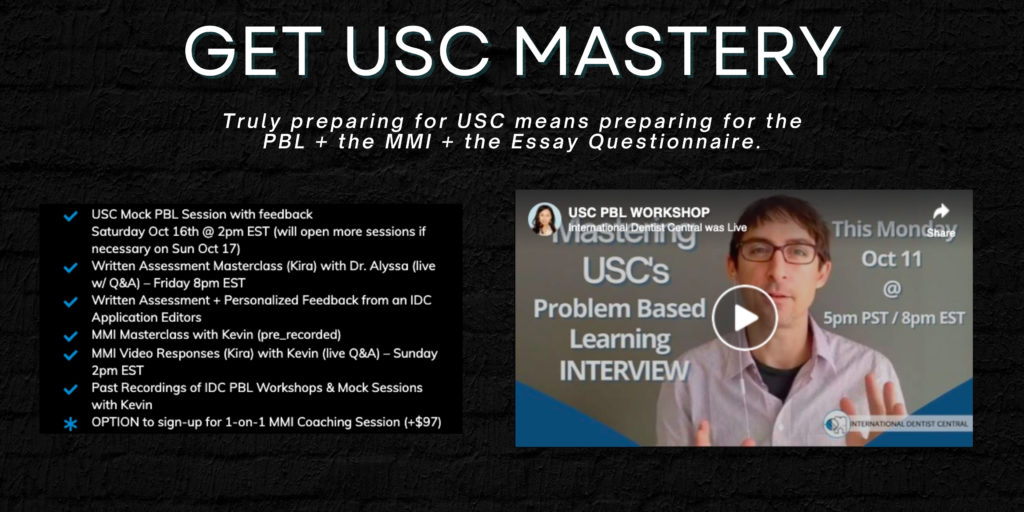Did you get invited to interview at USC’s Advanced Standing Program?
First off, congratulations. I know you had to work really hard to get here, and now you have an opportunity to get an acceptance in your hands if you play it well. You’re in the home stretches, you just need 1 school to accept you. So treat this opportunity like gold.
I’ve heard some people in our community say that PBL doesn’t matter, that during a PBL, that you’ll be fine if you just don’t act like a jerk. I wanted to touch upon this and more in today’s video regarding USC’s PBL interview.
I’m going to give you a condensed version of what you’re being tested on in this video, but if you have an interview coming up at USC, I invite you to watch the free workshop we ran about this topic that goes much deeper into everything, you’ll find a link below.
PBL is short for Problem Based Learning, and USC has long utilized PBL interviews to evaluate interviewees instead of traditional interviews like most other programs do. This is because USC, they don’t have a traditional classroom-based curriculum. Instead, the curriculum is based on PBL. So for USC, it’s important that they bring in individuals that can adjust well to a PBL learning environment.
In PBL, you work in groups, and you work on problems as a group and figure out how to solve the problem ahead of you. You find any books or resources that will answer questions you encounter, and as a group, find the best way to approach the problem. This can mean, for instance coming up with a treatment plan for a patient as a group, and in doing so learning about periodontal surgeries and implant contraindications. You have to do well in a group and have the learning initiative to do well in a PBL setting.
USC every year has held a PBL interview that simulates this kind of environment. Interviewees are divided into smaller groups and are given a problem to solve together as a group.
Now, to those who say “PBL doesn’t matter” – really? You’re going to approach this very important interview with that attitude? Why would you do that? Didn’t you have to do tons of work to get to this place, and suddenly faced with an interview, you’re going to take a ‘ it doesn’t matter’ approach?

Related Articles:
- How to Prepare for USC’s MMI & PBL Interview
- International Dentists And Multiple Mini Interviews (MMI)
Sure, they do want to make sure that you’re not a ‘jerk’ I’m using this word specifically because I saw people use it around social media before.
But if you were evaluating candidates, do you really think that’s all you care about?
Some evaluators are more discerning than others. Some are more lenient, and that’s why we hear a lot of interesting interview tails of USC interviewees, things some people did and still got accepted. I’d say that’s more luck or chance, OR they had a really good profile or bench test that when scores were tallied up, allowed them to still make the final cut.
Is that how you should approach the interview? I think not. Why take that kind of risk, when doing a good job ins’t actually that difficult? You just need to know what to do, and hopefully, also get some practice and feedback on how you did.
They are evaluating how you interact in a group setting and how, as a group, you arrive at a conclusion. NOT your medical knowledge. As dentists, it’s hard though to not point out when someone in your group makes a comment that is clearly inaccurate. You may be anxious that it’s reflecting poorly on you and your group. But be very careful how you point out that inaccurate information to your teammate. If you do it well, you’ll score a point. But do it badly, you’ll lose points, even if you’re comment was factually accurate. Because, again, they’re looking at how you’re interacting as a group, not at how smart you currently are.
Avoid extremes. First, don’t dominate. Don’t be condescending when talking to team members, even if they said something that’s totally wrong. Be civil. But also, second, don’t be silent. You have to strike a balance.
Also, if you find that someone on your team is completely quiet and really shy, try bringing them into the conversation will make you really stand out. Asking about their opinion when they have a hard time speaking up. People will be trying to find ways to talk, to stand out, and if you can be a leader that brings in the quiet person into the conversation, all the better for you.

Related Article: How to Prepare for the University of Michigan’s Multiple Mini Interviews
The evaluators are asking themselves, is this person a good fit for a problem-based learning process. Or are they perhaps a better fit for a more traditional lecture-based learning style? If they decide you are the latter, They make conclude that your perhaps not a good fit for USC, but for some other program.
Now, this advice sounds obvious and straightforward. But people routinely mess up after hearing this advice. Not because they don’t understand intellectually, but it’s a new kind of dynamic you have to get used to. Hence I recommend a practice session, it’s invaluable and can easily make the difference between acceptance and rejection.
Are you going to USC? Get USC Mastery here.








Leave A Comment